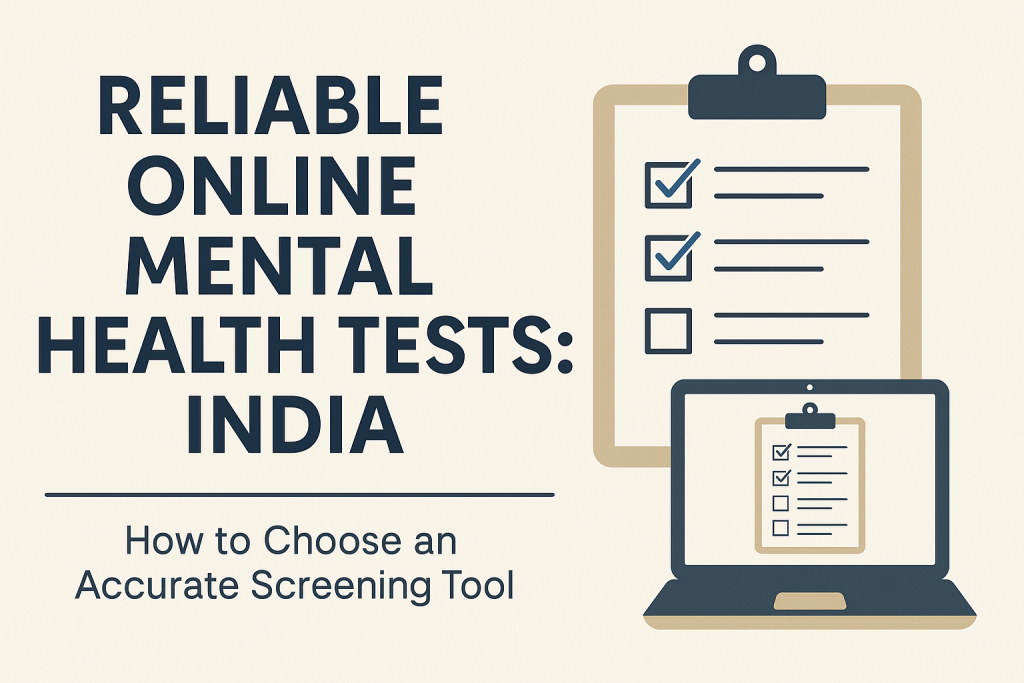Why This Matters More Than You Think
Google doesn’t always have the answer
These days, it’s not unusual to Google something like “Do I have anxiety?” or “Take a depression test online” at 2 a.m. when you can’t sleep. I get it — I’ve seen it with my clients, and I’ve been on the other side of those searches myself.

The internet makes it feel like answers are just a click away. And in some ways, that’s a good thing. We’ve never had more access to mental health information. But here’s the catch — not all online mental health tests are created equal. Some are carefully researched and clinically validated. Others are… well, just a bunch of questions thrown together with a score at the end.
The difference? It can mean the gap between getting real help and walking away with a label that isn’t even accurate.
Why Reliability in Mental Health Testing Matters
Mental health assessments aren’t like personality quizzes you take for fun. They’re based on years of research, tested for accuracy, and designed to help professionals (and you) understand what’s really going on.
When a test is reliable, it means the results are consistent and meaningful. You and your clinician can use them as a starting point for treatment or further evaluation. When it’s unreliable, it can point you in the wrong direction — which might delay the help you actually need.
Red Flags: How to Spot an Unreliable Online Test
If you’ve found a test online, pause for a moment and check for these signs:
- No source or author – There’s no mention of who created it or where it came from.
- No mention of validation – Reliable tests explain how they were developed and tested for accuracy.
- One-dimensional focus – They only test for one thing without checking related issues.
- No explanation of results – You get a number or label, but no real context.
- Suspiciously short – Some quick screenings are fine, but a five-question quiz claiming to diagnose you is a big red flag.
What a Reliable Test Should Include
When you’re taking a test seriously, look for these:
- The official name of the assessment (like DASS-21, PHQ-9, GAD-7, ASRS, AQ).
- Credible sources — created by psychologists or reputable research bodies.
- Validity and reliability data — usually published in a journal or academic setting.
- Comprehensive approach — checking for overlapping conditions or related factors.
- Clear follow-up advice — telling you what your results mean and what to do next.
Why Good Tests Cover More Than One Condition
In clinical practice, I’ve never tested for depression alone. If I suspect depression, I also check for anxiety, coping skills, and emotional regulation. If I’m testing for ADHD, I’ll also look at autism spectrum traits and emotional dysfunction or sensory overstimulation.
That’s because symptoms often overlap. Without a comprehensive approach, you risk missing the bigger picture. And mental health is all about the bigger picture.
How to Avoid Being Misled by Online Tests
- Search the test name and check if it’s used by professionals.
- See if the platform lists qualified mental health professionals.
- Be wary of tests that feel like clickbait or use oversimplified “signs.”
- Look for tests where you can download or share results with your therapist or psychiatrist.
When It’s Time to Speak to a Professional
An online test can be a great first step — a way to understand yourself better and decide if you want to seek help. But it’s not the same as a diagnosis. If your results raise concerns, take them to a licensed professional who can interpret them in context.
How Maya Minds Approaches This
At Maya Minds, every single test is:
- Clinically validated and clearly named.
- Designed to look at related conditions, not just one.
- Delivered with a detailed report you can take straight to your mental health provider.
Because clarity should never be a guessing game.
FAQs About Reliable Online Mental Health Tests in India
What is the most reliable online mental health test in India?
There isn’t just one — it depends on what you’re assessing. For depression, the PHQ-9 is widely trusted. For anxiety, the GAD-7. For ADHD, the ASRS. The key is using a test that’s validated and recognized by professionals.
How can I know if an online mental health test is accurate?
Check if it has an official name, mentions its source, and lists validation data. Avoid vague “symptom checkers” with no references.
Are free online mental health tests worth taking?
Some are, especially if they’re official tools shared by mental health organizations. But many free tests online aren’t validated, so choose carefully.
What’s the difference between a screening and a full assessment?
A screening is a quick check to see if further evaluation might be needed. A full assessment is in-depth, often covering multiple areas, and usually done by a professional.
Can I share online mental health test results with my doctor?
Yes — as long as the test is recognized and reliable, most professionals will consider it a useful starting point.